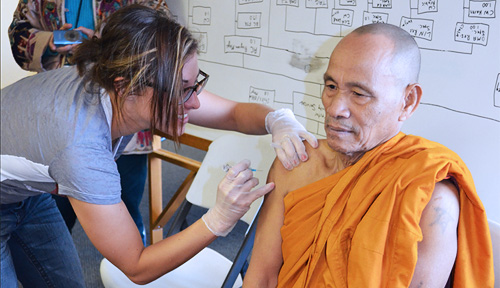Americans take much for granted – from refrigerators to toilets to health care.
 |
| Nurse Carri Stinn, flu shot coordinator with Bridge to Care, gives U Kyawthen, a monk from Burma, a flu shot at a refugee health clinic. |
But refugees seeking asylum from war zones in Southeast Asia, the Middle East
and Africa often don’t know what to put in a refrigerator, how to use a toilet, where to get their children immunized and that they can question their health provider.
They are among the 42 million people uprooted by war who have survived unsanitary conditions, sparse food and unclean water in crowded camps of makeshift tents.
Once in America, they must cope with an unfamiliar culture and a foreign language.
For the past two years, more than 135 UNMC students have engaged with more than 1,000 refugees from eight different countries, through the Bridge to Care (BTC) program.
This interprofessional initiative brings together students from medicine, public health, nursing, pharmacy and the allied health professions, to partner with community leaders, health care providers and community and state organizations serving the refugees of Nebraska.
BTC works directly with the Southern Sudan Community Association and the International Center of the Heartland (ICH) – the two federally designated providers of refugee resettlement agencies in Nebraska. The mission – educate, assist and empower refugees to become self-sufficient and culturally integrated
members of American society.
BTC assesses each refugee group’s specific needs, aides in understanding the health care system, and improves cultural awareness among community health care providers and students. In return, the students gain real-life experience in caring for the growing refugee population.
“This program helps us become culturally competent with these diverse groups,” said Thu Hong Bui, a second-year pharmacy student and president of BTC. “This will help me become a better pharmacist.”
The student-run program is coordinated through UNMC’s Service Learning Academy in the College of Public Health. Founding director is Ruth Margalit, M.D., associate professor of health promotion, social and behavioral health,
and a family physician.
“Service-learning seeks to link educational goals with experiences in our community by responding to health needs,” Dr. Margalit said. “Our students connect with people from various parts of the world. This local engagement deepens their understanding and assists students in developing global knowledge that will make them better practitioners. Global citizenship begins at home.”
In the past decade, refugees have resettled in Omaha from Sudan, Bosnia,
Afghanistan, Iraq, Liberia, Somalia (and Somali Bantu), Burundi, Ethiopia, Burma and Bhutan. ICH estimates there are up to 15,000 Sudanese (the largest group in the United States) and about 5,000 each of Somali and Burmese in Omaha.
During a leadership meeting last year, the refugee community identified five major areas of challenges: housing, health, education, employment and transportation. Some of the health issues include access to care, health literacy, well-balanced nutrition practices, maternal and child health, good hygiene care, post-traumatic stress disorder and depression.
Students meet with each group of refugees for three consecutive months, during which they address these issues, provide health education with the help of interpreters and share a cultural meal.
Before each monthly meeting, students hear from nurse Pam Franks, a longtime
supporter of refugees in Omaha who has extensive experience in global health. She explains the definition of ‘refugee’ and shares experiences, challenges and barriers they face before and after resettlement.
“Students develop their leadership, organizational and professional skills, learn to work with and appreciate students from other health care professions, develop cultural awareness and civic responsibility while providing service to the community,” Dr. Margalit said.
“And there is added value in this experience – community engaged scholarship.
One student used the program to complete her capstone project for a master’s in public health. The program was presented at an international conference on global health and a manuscript for peer review publication is in preparation.”
Bridge to Care began in 2010 by a fourth-year medical student who recognized the need for students to learn hands-on about refugees, become more culturally competent and serve these communities.
The program was initially funded by a grant from the College of Medicine Alumni Association and then received substantial funding from the College of Public Health Dean’s challenge grant. In addition, the office of Minority Health, Nebraska Department of Health and Human Services, helps with funding, materials and other support.
Assimilation into a new culture is challenging and requires physical and emotional resources. For children and youths, it can be confusing and some refugee youths turn to risky behaviors to feel included. Nurse Carri Stinn, a
previous student volunteer and now the flu shot coordinator with BTC, worries about refugee youths becoming involved with violence.
In addition to the monthly meetings, BTC sponsors flu shot clinics in the fall, an annual health fair in the spring and participates in the citywide World Refugee Day each year in June.
Elsie Forsung, a native of Cameroon, is a third-year pharmacy student and BTC vice president. Her father works for the United Nations and helps refugees from Africa settle in the United States.
“He doesn’t know what happens to them after they arrive so he was happy that we’re here to make a difference,” she said. “It sort of completes the circle.”
“This is global health right here in Omaha.”